Closed community
A closed community intentionally limits links, colonization, or reproduction between other citizens and communities. Usually keeping communication between themselves by excluding the outside world. Reasons for this type of living may vary from; religious purposes, medical beliefs, financial standing etc. Communities in general can range from a group of thousands of people to simply a handful of residents, within a closed community there could either be one chief leader or an executive board that runs operations by the public but keeps the process private. Typically, closed communities go by invitation only or a persons own will to be within the community. The opposite of this term would be an open community where they maintain social relations[1] and interactions with others, the objective of such community resides in the efforts and collaboration of all citizens, anyone is allowed to commence a life among these people.[2][3]
Societies deal with the systemic belief of the existing social ties between humans and a community in itself is the existence of human life residing in a specific area.
There is not a set number of how many closed communities exist in the world; many of them are known to us and many remain undiscovered. Some too sacred to be exposed and others that people may not consider to classify as a closed community. Communities can also include:
- Countries like Russia and Japan
- Cities and towns like the Vatican City, Little Italy, and Chinatown
- Civilizations/religious settlements like the Aztec, Amish, and Monks
- Camps like Refugee camp
A gated community has a similar concept, lifestyle, and definition of a closed community, but differ in the sense where a gated community is more of a preference for comfort in your every day life. Gated community is seen more as many individual homes in a huge assigned area. Where in each household there are individual opinions, usually gated communities (since there are so many on this present day)[4] don't hold any real governmental power. Residents might have a committee of executive board members who lay down rules and apply fines but residents are free to leave whenever (sell the house). They co-exist with the outside world as in: do groceries at a supermarket with other people from other gated communities, attend public schools and office jobs etc.[5]
Development
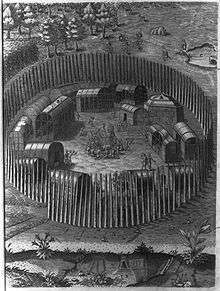
Frederic Clements was an American ecologist and pioneer who studied vegetation formation and development, he created the idea that plants are supposed to birth, grow/mature, and decay. Their life cycle is similar to that of a human being. Clements also tested a theory known as "climax community"; he used areas of vegetation in comparison to actual communities. The community (fauna or human) is always constant and thriving, even if there were to be a catastrophic event, an individual or small group can manage to survive and regrow or rebuild in the same area they originated or relocate else where and succeed. The concept of many plants and animals coexisting together, having an ecosystem and building upwards was the theory he aimed for (example: rain forest). The general theory later failed due to the fact that that there was little or extremely basic comparable information about the logic of a being, the concept worked more in favor towards smaller organisms. Also, the theory became outdated and later on replaced with new sociological facts or science theories.[6][7]
The two extremes of a closed communities from where the original idea branched out can vary from the two scenarios of: having established or developing a significant purpose for social detachment such as; ancient or sacred tribes that shut themselves out from modernization. Who choose to live discreetly in their own territory usually in an unhabitated island or forest. They conserve and protect their beliefs, rituals, and lifestyle to only members of their tribe, their way of living can seem strange or "taboo" to some and that is the precise reason to why it is a closed community that has existed for ages and will continue to exist far from wherever they can be exposed or judged.[8] The other type of closed community is the "punishable" type of isolation that existed in earlier times when convict's were sent away to undiscovered land far away from their home.[9] It is said that the British sen overt many convicts to the undiscovered lands such as Australia and America to explore and colonize.[10] This is another example of a closed community for the two reasons of being sent away from their residency/homeland and later establishing among themselves in order to not interact with the Native Americans in the United States. In the adjacent picture the Town of Pomeiock is and accurate representation of how private settlement was lived and presented, yes there is a huge territory around them but they closed themselves among wood trunks in order to use their resource education, work, etc.
Pros
- Security of residing in a controlled/supervised area
- Easier to find common interest, idea development with someone in your community
- Being able to finish work more efficiently, naturally, and more originally due to having no interference with exterior[11]
Cons
- Limitation and "cut-off" of diversity which leads to more difficulty accepting or incorporating outside concepts
- Constantly having the same people in a closed area within a large communities of 50 or more can cause a resident to feel overwhelmed with an urge to escape
- The fear of being overpowered or intimidation/competition
- Can close themselves so off from advancements that have a hard time reintegrating into society[12]
There are two sides to the economic world of a closed community; either they develop their own economy and have a functioning financial system which was established through their many years of closure and they're ability to prosper markets or goods and services using trade (goods or services in exchange for food, or a haircut,etc.) as payment, or there could be no true economic standing for closed communities; because most are either giant countries, developed towns, or off the grid communities, the economic well being of each community would be different, depending on how many members they have registered, whether they produce their own supplies, or if they are granted supplies from a bigger source than themselves. A closed community can harvest their own food and produce their own items such as; livestock, blankets, pots, clothes, agriculture, and so on where everyone has to contribute something. Or they could be inserted in the community for experimental reasons and be given monthly aid of supplies and food, lastly they like everyone else files taxes and reports to the government actual head count.[13] Now in the case where a separate community is created for those of less power or lower economic standing did indeed exist in earlier times when royalty and peasants functioned actively in society[14] referenced in the article these people where placed in this category, some even born into it. That is when they work for the economic standing of the 'kingdom', they work and belong in an heir achy which is a closed community but more of a dictatorship. Closed community because the king and queen protected their people from the dangers and closed off the area so those who worked would remain loyal and for no outsiders to question or pose a threat.
Medicine-related communities
There have been cases of independent groups being diagnosed with infectious, contagious, rare, and in cases deadly diseases. When the happens there has to be immediate action taken from the government or approved medical personnel.[15][16] When one person is sick, what usually happens is that a family member or friend might try taking care of their loved one, and slowly that is how the disease starts spreading to other people within the same community. Death rates increase and the cure to the illness is non existent.[17][18] That is when the enclosure of all indisposed people occurs, they put all the sick people in a contained area to further examine the symptoms and to prevent outspread. The people residing in this closed community are revised constantly and given vacciens, treatments, remedies, some natural and some made in laboratories. Usually the awareness of such communities come through the word "quarantine" being said on the news, or fictional horror movies and shows.[19]
Another extreme case for such seclusion could be for experimental reasons, per se; the study of human behavior and existence, or human reaction towards a dependent variable.[20] Usually happens in remote areas where no one would bother to interfere. People are contacted to sign up or some participate voluntarily for money reward. In order for the experiment or observation to function, and for the data to remain viable, these people have to live alone amongst themselves. To be clear, there have been situations that have gotten out of hand; subjects not being aware of their trail, misleading or incorrect knowledge that was given to the subject when the experiment was being conducted.[21][22] Regardless of the extreme cases, these medical closed communities continue to improve our research when it comes to and save lives.
Refugee Camps
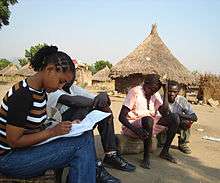
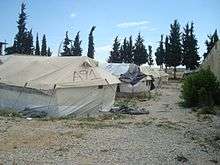
Refugee camps serve as a shelter to people that have been displaced because of wars, political oppression, natural disasters, religious beliefs or protection due to those same beliefs. Although considered to be temporary, most refugee camps have been existing for so long that they have developed their own schools, markets, traditions, customs and lifestyles.[23] There are refugees all over the world; a refugee is a person or resident that has been forced out of his or her home, country, or town in order to be protected by the government.[24][25] When people are forced out in such manner they search for asylum which stands for the protection granted by a nation; organizations like United Nations High Commissioner for Refugees (UNHCR)[26] provide this care and more; like assistance and medical care to millions of people world wide. There are also specific groups such as United Nations Relief and Works Agency (UNRWA)[27] located in the Near East to provide jobs to Palestinian refugees. Some camps are larger than others and most of them live in very poor conditions. The government will provide a decent amount of land for camping grounds in order to build small houses, shacks, tents, or house people to house in.
The population of refugee camps are accounted for, camps range from four hundred thousand inhabitants to simply four thousand, such camps are typically more common in undeveloped countries. The dangers for this are primarily health and family separation, families get split up and are forced to go separate ways. Many loose contact, end up in other countries, or stay together in the refugee camp [28] People have had to endure suffering, trauma, violence and much more.[29] These people always live in a state of emergency, most of them never get the chance to resettle. That is the reason why a refugee country exist [30] there are even developed countries that are receiving refugees, the need to try to protect the children and give them an education. There are many projects and volunteer opportunities to help refugees/immigrants prosper; that means job opportunities, safety, income, and a better quality of life for these people. Refugee camps are seen as prisons, a single government can run more than one camp. For example the Turkish government sustains twenty-two camps. Other camps that are fortunate enough to be luxurious have maintenance, electricity, and plumbing.[31]
When it comes to dealing with peoples lives and a country's population (in order to not over populate) governments have developed, created, and enforced tons of protocols, bylaw, rules and such to ensure that the human rights of all refugees are respected. They are to be treated properly, evaluated, relocated, and given a status.[32] The goal is for them to be reintegrated and live a normal life, but most people forget that they have equity, that is why refugees continue to suffer even in their new stage of life; sometimes facing racism, threats, and persecution.[33]
Religious/Cultural Communities

Practices, beliefs, and culture can be the guide of a persons life, a religion itself can lead to emotional and/or physical separation and dedication. Either you're born into a religion and have your faith chosen for you, or you can decide at a certain age wether to live upon that religion or join modern society, or lastly you can choose to not follow any religion at all.[34][35] A disconnected lifestyle that may bring an individual or group peace, verification, and belonging. A prime example could be Monks or Nuns who practice monasticism; what is called "Nirvana" or "Heaven" requires spiritual work that they pursue during a lifetime in order to be rewarded in an afterlife. A present life that requires zero distractions and many sacrifice, they close themselves off to live life in its purest form free of sin or evil.[36] Judgment from others can further drive people away, religions and practices are often criticized and offended which leads to them being kept secretive. Fear of the confiscation of their religion can also lead them to live exclusively amongst themselves. A closed religious community can express itself through any religion/denomination: Catholicism, Buddhism and Christianity Hinduism, Jainism, Islam, Judaism, and all others. They can live, practice, or worship anywhere, they can choose to live alone or with other followers. We usually see these groups living away from urban and suburban communities. They live by their own codes, rules, and laws. You can look at the Amish people and their traditional life style as an example, they cause curiosity to all outsiders because of how they live and how they practice their religion.[37] The Amish people have certain exemptions to American Constitutional Laws,[38] they have their own leaders just like Catholics do; and that would be the Pope. Their private community called Vatican City or Vatican City State has a different law jurisdiction.[39] Christian's follow enclosed religious orders, conservative and very uptight with rules.
More conventional and ancient groups could also include extremest or unknown parties that exist or existed. Some rare, others taboo, and some undiscovered like: polygamist, cults,[40] secret societies, ancient societies, and empires are only a few prime examples. Some practices are untraceable and mysterious because ancient cultures go back way too far in time for scientist to fully understand how things happened or their reason for happening. Practices of empires like the Inca Empire or the Aztec Empire and their people are to this day unknown, we do know that they were living closed off, having their own population of people and protecting each other. Towns that had their own royalty/kings, Gods, and a economic system just like the Egyptians. We consider their way of life fascinating when it comes to technological and medical advances, but barbaric when it comes to religious rituals.[41] There are those who act upon what is considered to be illegal and frowned upon, like having more than one spouse (Legal status of polygamy). We learn about all types of groups and civilizations in modern education, for the purpose of learning history and further development.[42][43][44]

When immigrants decide to relocate to a new country or state some of them suffer from homesickness and culture shock. It is not easy to adapt to a new culture, language, food, and living. People migrate to other places in search for better opportunities such as; income/money, jobs, social freedom, political liberation, religious expression, environment safety, or many other different reasons.[45] They leave their whole life behind and start all over.[46] Escaping or moving is not easy, and for the handful that find themselves even more miserable then before due to the fact that is has been extremely hard for them to accustom and do to the lack of acceptance coming from others that already have themselves established,[47][48] they seek refugee in neighborhoods that are populated by people of their same background or race. They feel comfort in knowing that others have the same struggles as they do, that they can help each other out and trust in one another.[49] These "towns" have been around since mid 1800's, they try to recreate their original home and traditions in order to adapt to their new way of life. Immigrants make these towns as similar to home as they can, therefore "mimicking" their home away from home. Minorities come together in multicultural/cultural neighborhoods and become close knit for further expanding, causing them to be extremely touristic. These places and neighborhoods include but are not limited to:
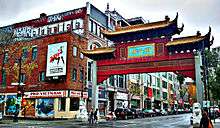
Closed Countries
A "closed" country can be considered heavily censored but not necessarily communist. A country that is closed off prohibits information and ideas along with goods and services from coming in or out of its boarders. No one really knows how people live in countries like this, the world usually finds out through exposure; leaked photos of unhygienic poverty, unequipped hospitals, or lack of modernization.[53][54] Other ways of reveal can be when a refugee escapes and tells all its countries secrets and cruelty they might have suffered/experienced. A good example for that specific case would be Park Yeon-mi who became a human rights activist after running away from her homeland in North Korea.[55] A country chooses seclusion amongst their people in order to focus on themselves, thinking that they don't need any influence from the rest of the world to develop. Closed cities are highly guarded and require authorization for any kind of traveler trying to go out and anyone that is trying to spend the night, they are extremely vigilant on their country/town population. Most countries close off during times of weakness, recessions, or economic depressions and instability.
Currently Closed Countries and Once Closed Country
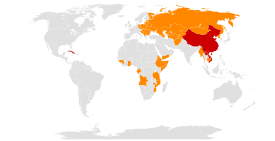
(not limited to these only)
- Albania[56]
- Bhutan
- China
- Japan[57] - Japan exercised a policy called Sakoku that closed off its doors to foreigners, was temporary.
- North Korea[58]
- Soviet Union[59] - Russia,[60][61] Armenia, Azerbaijan, Belarus, Estonia, Georgia (country), Kyrgyzstan, Latvia, Lithuania, Moldova, Tajikistan, Turkmenistan,[62] Ukraine, and Uzbekistan
- Switzerland[63]
- Myanmar/Berma[64]
- Libya
- Eritrea
- Saudi Arabia
- Ethiopia
- Azerbaijan
- Vietnam
- Iran
- Cuba
Symbols: Berlin Wall (1961-1989)
This closure can also be referred to as isolationism, where policy keeps a country apart and separate from foreign affairs, interest, and conflicts. During a time of war this stance would be considered as neutral. The policy can either be political or economic, this is the time were the country could be be either recovering from a recession or unable to afford military spending.[65] What is called "censorship by country" stands for the suppressing and distorting of all activity and news coming from outside the country, the country itself may not want its people to see a "normal life" and items: toiletries, cosmetics, clothing/fashion, podcast, abundance of food, traditions, liberty/freedom/rights, etc. They want their people to believe that the higher caste, class, or leaders, deserves these type of items.[66] Therefore the public living in that country believes that items like that are unaffordable luxuries and they most continue working for their leader. Instead of showing every citizen updated and current media, they show them propaganda.[67] This occurs within communism[68] also known as Red flag (politics), dictators look for the worship and following from all people. Opressing and occulting foreign media, dictators[69] decide what to teach in school, how many rations of food to give, what to do with the military, etc. Considered to be an autocratic form of government, if people that go agains them could face; death, jail, and exhale for him or herself and possibly all generations to follow will also suffer these consequences.[70][71]
Bibliography
Country, Great American. "What It’s Like to Live in a Multicultural Neighborhood." GAC. N.p., n.d. Web. 28 Nov. 2016.
Pike, John. "Weapons of Mass Destruction (WMD)." Secret Cities. N.p., n.d. Web. 28 Nov. 2016
"Anatomy: World’s Most Isolated Countries." World Policy Journal 30.1 (2013): 22-23. Web.
Reiff, Joseph T. Born of Conviction: White Methodists and Mississippi's Closed Society. NY, NY: Oxford UP, 2016. Print.
Vollers, Yeonmi Park Maryanne. "In Order to Live." Goodreads. N.p., n.d. Web. 28 Nov. 2016.
Erler, Mary Carpenter. Reading and Writing during the Dissolution: Monks, Friars, and Nuns 1530-1558. New York: Cambridge UP, 2013. Print.
@UNRWA. "Palestine Refugees | UNRWA." UNRWA. N.p., n.d. Web. 25 Oct. 2016.
Kinkead, Gwen. "CHINATOWN: A PORTRAIT OF A CLOSED SOCIETY." CHINATOWN: A PORTRAIT OF A CLOSED SOCIETY (1992): n. pag. Print. New York, NY: HarperCollins Publishers
Gibney, Mark. Open Borders? Closed Societies?: The Ethical and Political Issues. New York: Greenwood, 1988. Print.
Nakhimovsky, Isaac. The Closed Commercial State: Perpetual Peace and Commercial Society from Rousseau to Fichte. Princeton: Princeton UP, 2011. Print.
Symbol and Meaning Beyond the Closed Community[72]
Gontier, Thierry. "Open and Closed Societies: Voegelin as Reader of Bergson." Politics, Religion & Ideology 16.1 (2015): 23-38. Web.
Open communities vs closed communities [73]
Dagan1, Ron, Serge Gradstein1, Ilana Belmaker2, Nurith Porat1, Yaffa Siton2, Gabriel Weber1, and And Jacob Janco1. "Ron Dagan." An Outbreak of Streptococcus Pneumoniae Serotype 1 in a Closed Community in Southern Israel. N.p., n.d. Web. 26 Oct. 2016.
ISBN 978-1429232241 ISBN 1429232242
References
- ↑ http://www.aaai.org/ocs/index.php/ICWSM/09/paper/viewFile/228/571
- ↑ https://amirone2006.files.wordpress.com/2014/02/aldrich-and-ruef-2006.pdf
- ↑ Wuthnow, Robert (2013-01-01). Small-Town America: Finding Community, Shaping the Future. Princeton University Press. ISBN 9780691157207.
- ↑ https://www.researchgate.net/profile/Mariana_Osman/publication/283288980_An_Investigation_of_Factors_Influencing_Communities_Decision_to_Reside_in_Gated_Development_in_Kuala_Lumpur_and_Selangor/links/5735446008ae9ace84095c5a.pdf
- ↑ "What Is the Meaning of a Gated Community?". Retrieved 2016-10-19.
- ↑ http://www.esf.edu/efb/schulz/seminars/mcintosh.pdf
- ↑ "Frederic E. Clements". www.history.ucsb.edu. Retrieved 2016-10-25.
- ↑ "10 Tribes That Avoided Modern Civilization". Listverse. 2013-01-24. Retrieved 2016-10-19.
- ↑ Office, Digital Transformation. "Convicts and the British colonies in Australia | Australia.gov.au". www.australia.gov.au. Retrieved 2016-10-19.
- ↑ Novak, Matt. "Britain Sent Thousands of Its Convicts to America, Not Just Australia". Paleofuture. Retrieved 2016-10-19.
- ↑ http://www.hr-network.hu/szolgaltatasok/open_and_closed_organizations.pdf
- ↑ "Should your online community be open or closed? | Online Community Results". Retrieved 2016-10-19.
- ↑ root (2010-02-24). "Closed Economy". Investopedia. Retrieved 2016-10-27.
- ↑ Wolf, Eric R. (1957-04-01). "Closed Corporate Peasant Communities in Mesoamerica and Central Java". Southwestern Journal of Anthropology. 13 (1): 1–18. doi:10.1086/soutjanth.13.1.3629154. ISSN 0038-4801.
- ↑ Kuzushima, Kiyotaka; Kudo, Toyoichiro; Kimura, Hiroshi; Kido, Shinji; Hanada, Naoki; Shibata, Motohiro; Nishikawa, Kazuo; Morishima, Tsuneo (1992-03-01). "Prophylactic Oral Acyclovir in Outbreaks of Primary Herpes Simplex Virus Type 1 Infection in a Closed Community". Pediatrics. 89 (3): 379–383. ISSN 0031-4005. PMID 1311067.
- ↑ Dagan, Ron; Gradstein, Serge; Belmaker, Ilana; Porat, Nurith; Siton, Yaffa; Weber, Gabriel; Janco, Jacob; Yagupsky, Pablo (2000-02-01). "An Outbreak of Streptococcus pneumoniae Serotype 1 in a Closed Community in Southern Israel". Clinical Infectious Diseases. 30 (2): 319–321. doi:10.1086/313645. ISSN 1058-4838.
- ↑ Gardner, P. S.; Cooper, Christine E. (1964-06-01). "The feeding of oral poliovirus vaccine to a closed community excreting faecal viruses". The Journal of Hygiene. 62 (2): 171–178. ISSN 0022-1724.
- ↑ Yagupsky, Pablo; Ben-Ami, Yael; Trefler, Ronit; Porat, Nurith (2016-02-01). "Outbreaks of Invasive Kingella kingae Infections in Closed Communities". The Journal of Pediatrics. 169: 135–139.e1. doi:10.1016/j.jpeds.2015.10.025. ISSN 1097-6833. PMID 26545728.
- ↑ "21 Terrifying Horror Movies Featuring Isolated Environments - HorrorMovies.ca". HorrorMovies.ca. 2013-12-14. Retrieved 2016-10-25.
- ↑ "Top 10 Experimental Towns and Communes - Toptenz.net". Toptenz.net. 2010-05-14. Retrieved 2016-10-25.
- ↑ Bell, Larry. "EPA Charged With Lethal Experiments On Hundreds Of Unsuspecting Subjects". Forbes. Retrieved 2016-10-25.
- ↑ http://www.washingtontimes.com, The Washington Times. "MILLOY: EPA's illegal human experiments". The Washington Times. Retrieved 2016-10-25.
- ↑ "World's largest Syrian refugee camp has developed its own economy". PBS NewsHour. Retrieved 2016-10-25.
- ↑ "Refugees & Asylum". USCIS. Retrieved 2016-11-08.
- ↑ "Learn About the Refugee Application Process". USCIS. Retrieved 2016-11-28.
- ↑ Refugees, United Nations High Commissioner for. "Sudanese refugees in Ethiopia clamour for repatriation to southern Sudan". UNHCR. Retrieved 2016-11-26.
- ↑ "Education | UNRWA". UNRWA. Retrieved 2016-11-26.
- ↑ "Calais Camp - Total number of residents revealed for the first time - 423 unaccompanied minors - Help Refugees". Help Refugees. Retrieved 2016-11-26.
- ↑ https://www.urj.ucf.edu/docs/guler.pdf
- ↑ "Ten countries host half of world's refugees: report". www.aljazeera.com. Retrieved 2016-11-26.
- ↑ Mcclelland, Mac (2014-02-13). "How to Build a Perfect Refugee Camp". The New York Times. ISSN 0362-4331. Retrieved 2016-11-28.
- ↑ "Asylum & the Rights of Refugees". International Justice Resource Center. 2012-10-10. Retrieved 2016-11-28.
- ↑ Affairs, World (2015-11-30). "3 U.S. Refugee Laws Everyone Forgets". The Federalist. Retrieved 2016-11-28.
- ↑ "Should Children Make Up Their Own Minds About Religion? | Jason Stubblefield". First Things. Retrieved 2016-11-28.
- ↑ Resource, Inuit Cultural Online; Resource, Inuit Cultural Online (2010-03-01). "Inuit Life Modern VS Traditional". icor.ottawainuitchildrens.com. Retrieved 2016-11-28.
- ↑ sibtainhaider (2012-09-05). "Religious seclusion–wrong". Sibtain's. Retrieved 2016-11-28.
- ↑ "Amish People and Amish Culture - LancasterPA.com". LancasterPA.com. Retrieved 2016-11-28.
- ↑ "U.S. Supreme Court Case: Is There Religious Freedom in America -- for the Amish?". amishreligiousfreedom.org. Retrieved 2016-11-28.
- ↑ "Researching the Law of the Vatican City State - GlobaLex". www.nyulawglobal.org. Retrieved 2016-11-28.
- ↑ "What's the difference between a religion and a cult?". Hopes&Fears. Retrieved 2016-11-28.
- ↑ "Sacrifices in Ancient Cultures". gallery.sjsu.edu. Retrieved 2016-11-28.
- ↑ William, William, Kephart,Zellner (1991). Extraordinary Groups: An Examination of Unconventional Lifestyles. New York: St. Martin's Press. ISBN 0312031696.
- ↑ "Secret Teachings of All Ages: The Ancient Mysteries and Secret Societies Which Have Influenced Modern Masonic Symbolism". www.sacred-texts.com. Retrieved 2016-10-19.
- ↑ "The Forbidden Knowledge of Secret Societies - 01". www.bibliotecapleyades.net. Retrieved 2016-10-19.
- ↑ "Why do people immigrate to the U.S.?". U.S. Immigration. Retrieved 2016-11-28.
- ↑ "Why people migrate: 11 surprising reasons". Global Citizen. Retrieved 2016-11-28.
- ↑ Editor, Braden Goyette Senior; Post, The Huffington (2014-11-11). "How Racism Created America's Chinatowns". The Huffington Post. Retrieved 2016-11-29.
- ↑ Worby-Ryan, Rachelle (2013-05-25). "Immigration: We regret coming here". Stuff.co.nz. Retrieved 2016-11-28.
- ↑ "Ethnic enclaves". Immigration to the United States. Retrieved 2016-11-29.
- ↑ "Chinatown | The Story of Chinatown". www.pbs.org. Retrieved 2016-11-29.
- ↑ Sangha, Soni (2014-09-16). "Latino Neighborhoods: El Barrio, Or Spanish Harlem, Still Standing Strong In New York City". Fox News Latino. Retrieved 2016-11-29.
- ↑ "Barrio Logan Community Committee | City of San Diego Official Website". www.sandiego.gov. Retrieved 2016-11-29.
- ↑ "Inside the Cuban Hospitals That Castro Doesn't Want Tourists to See". PanAm Post. 2015-10-06. Retrieved 2016-11-29.
- ↑ "North Korea exposed: Censorship in the world's most secretive state". CJFE | Canadian Journalists for Free Expression. Retrieved 2016-11-29.
- ↑ "Turkey: Illegal mass returns of Syrian refugees expose fatal flaws in EU-Turkey deal". www.amnesty.org. Retrieved 2016-11-29.
- ↑ "A CLOSED AND POOR COUNTRY - ALBANIA". Gezimanya. 2013-04-27. Retrieved 2016-11-29.
- ↑ "The Seclusion of Japan". users.wfu.edu. Retrieved 2016-11-29.
- ↑ "Exposing North Korea - Photo Essays". TIME.com. Retrieved 2016-11-29.
- ↑ "Union of Soviet Socialist Republics facts, information, pictures | Encyclopedia.com articles about Union of Soviet Socialist Republics". www.encyclopedia.com. Retrieved 2016-11-29.
- ↑ "Countries in the Soviet Union | History of Russia". historyofrussia.org. Retrieved 2016-11-29.
- ↑ Yegorov, Oleg (2016-05-02). "A sheltered existence: Life in Russia's closed cities". Russia Beyond The Headlines. Retrieved 2016-11-29.
- ↑ "How to live in Turkmenistan Trip to one of the most closed countries in the world. Part 2". Ukrop News 24. 2016-04-12. Retrieved 2016-11-29.
- ↑ swissinfo.ch, Igor Petrov, in Wabern,. "'Switzerland was a very closed country' - SWI swissinfo.ch". SWI swissinfo.ch. Retrieved 2016-11-29.
- ↑ ""Burma VJ: Reporting from a Closed Country"". Democracy Now!. Retrieved 2016-11-29.
- ↑ "Isolationism". Retrieved 2016-11-29.
- ↑ "20 Things I Learned While I Was in North Korea". Wait But Why. 2013-09-27. Retrieved 2016-11-29.
- ↑ "Mainstream Media Censorship Exposed". American Free Press. 2013-02-20. Retrieved 2016-11-29.
- ↑ Group, Chasing Vision Media. "The Schwarz Report | Essays". www.schwarzreport.org. Retrieved 2016-11-29.
- ↑ "How do dictators come to power?". Reference. Retrieved 2016-11-29.
- ↑ "10 Most Censored Countries - Committee to Protect Journalists". www.cpj.org. Retrieved 2016-11-29.
- ↑ "Communist Party of the Soviet Union (CPSU) | political party, Union of Soviet Socialist Republics". Encyclopedia Britannica. Retrieved 2016-11-29.
- ↑ "University Press of Colorado - Symbol and Meaning Beyond the Closed Community". Retrieved 2016-10-03.
- ↑ Rahman, Zara. "Open communities vs closed communities - what's more inclusive? - zararah.net Zara Rahman". zararah.net. Retrieved 2016-10-11.
External links
- http://www.oxfordbibliographies.com/view/document/obo-9780199830060/obo-9780199830060-0011.xml
- http://journalistsresource.org/studies/government/criminal-justice/the-impact-of-community-policing-meta-analysis-of-its-effects-in-u-s-cities